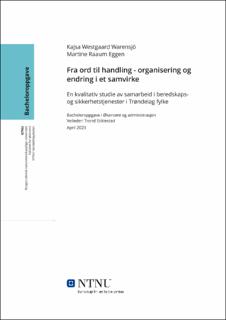| dc.contributor.advisor | Stiklestad, Trond | |
| dc.contributor.author | Warensjö, Kajsa Westgaard | |
| dc.contributor.author | Eggen, Martine Raaum | |
| dc.date.accessioned | 2023-07-13T17:21:59Z | |
| dc.date.available | 2023-07-13T17:21:59Z | |
| dc.date.issued | 2023 | |
| dc.identifier | no.ntnu:inspera:140915253:145866341 | |
| dc.identifier.uri | https://hdl.handle.net/11250/3078783 | |
| dc.description.abstract | Temaet for denne oppgaven er samvirke mellom beredskaps- og sikkerhetsorganisasjoner, herunder forsvaret, politi, Statsforvalter og kommune. I forbindelse med høyt medietrykk omkring Ukraina-krigen, ble vi nysgjerrige på hvordan sentrale aktører i Trøndelag fylke både organiserer, forbereder og utfører samarbeid. Formålet med bacheloroppgaven er å undersøke styrker og svakheter ved samarbeid mellom organisasjonene ved større endringer, med fokus på kriser. Derfor formulerte vi problemstillingen slik: “Hvordan samarbeider sentrale beredskaps- og sikkerhetsaktører i Trøndelag fylke med hverandre ved håndtering av kriser?”.
Innhenting av empiri ble gjennomført gjennom dybdeintervju, for å drøfte relevant teori opp mot problemstillingen best mulig. Vårt teoretiske fundament baseres på en redegjørelse av hva organisasjonene utgjør i et samarbeid. Derav benytter vi teorier innenfor taktisk organisering, beredskapsplanlegging som en endringsprosess, og interorganisatorisk samarbeid. Vi knytter problemstillingen opp mot tidligere forskning, som vi supplerer med kvalitativ forskning basert på syv intervjuer. Resultatene viser at problemløsninger bør finne sted på både høyt og lavt nivå i systemet. Funnene kan være av interesse for ledere i de sentrale organisasjonene, og videre forskning.
Forskningen har vist forekomster av svakheter og styrker i de organisatoriske strukturene. Oppgaven har belyst viktigheten av en sterk beslutningsmyndighet ved kriser, og at dette er nødvendig for å samarbeide på tvers av organisasjonene. Samtidig er den interne organiseringen av stor betydning, slik at aktørene får utviklet seg selvstendig sammen med de dynamiske omgivelsene. For å sikre en god informasjonsflyt er det viktig at aktørene har en god organisasjonskultur, både innad i organisasjonen, og mellom seg i de sentrale aktørene. I den forbindelse har funnene vist til at klar ansvar- og rollefordeling gir et mer effektivt samvirke. Vi har også diskutert de ulike krisehåndteringsprinsippene, hvor samvirkeprinsippet blir vektlagt av større betydning enn ansvarsprinsippet ved håndtering av kriser. Oppgaven fremhever behovet for felles situasjonsforståelse i aller høyeste grad. | |
| dc.description.abstract | The topic of this thesis is cooperation between emergency and security services, including the armed forces, police, the County Governor and the municipality. Due to the high media attention surrounding the war in Ukraine, we became curious about how the different participants in Trøndelag County organize, prepare and perform cooperation. The purpose of the bachelor's thesis is to examine the strengths and weaknesses of cooperation between the organizations during major changes, with a focus on crises. On behalf of this we formulated the problem as follows: "How do central emergency and security services in Trøndelag County cooperate with each other when managing crises?".
The collection of empirical data was gathered through in-depth interviews, in order to discuss relevant theory against the problem in the best way possible. Our theoretical foundation is based on an explanation of what the organizations do in a collaboration. Therefore, we use theories within tactical organization, emergency preparedness planning in a change process, and inter-organisational cooperation. We relate the topic question to previous research, which we supplement with qualitative research based on seven interviews. The results show that problem solutions should take place at both high and low levels in the system. The findings may be of interest to managers in the central organizations, and further research.
The research has shown occurrences of weaknesses and strengths in the organizational structures. The assignment has highlighted the importance of a strong decision-making authority in crises, and how this is necessary for cooperation across the organizations. At the same time, the internal organization is of great importance, so that the services can develop independently with the dynamic surroundings. To ensure a good flow of information, it is important that the actors have a good organizational culture, both within the organization and between themselves. In this context, the findings have shown that a clear distribution of responsibilities and roles results in more effective cooperation. We also have discussed the various crisis management principles, where the principle of cooperation is emphasized as more important than the principle of responsibility when managing crises. The bachelor´s thesis calls attention to the importance of a shared understanding of the situation. | |
| dc.language | nob | |
| dc.publisher | NTNU | |
| dc.title | Fra ord til handling - organisering og endring i et samvirke | |
| dc.type | Bachelor thesis | |
